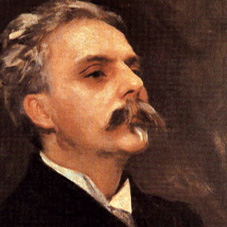
Bio
Gabriel Fauré (1845 — 1924) was a French composer whose refined and gentle music influenced the course of modern French music. Fauré’s musical abilities became apparent at an early age. When the Swiss composer and teacher Louis Niedermeyer heard the boy, he immediately accepted him as a pupil. Fauré studied piano with Camille Saint-Saëns, who introduced him to the music of Franz Liszt and Richard Wagner. Fauré was not especially attracted to the theatre, but he wrote incidental music for several plays, Mélisande (1898), as well as lyric dramas. Among his few works written for the orchestra alone is Masques et bergamasques (1919). Although he had deep respect for the traditional forms of music, Fauré delighted in infusing those forms with a mélange of harmonic daring and a freshness of invention. One of the most striking features of his style was his fondness for daring harmonic progressions and sudden modulations, invariably carried out with supreme elegance and a deceptive air of simplicity. His quiet and unspectacular revolution prepared the way for more sensationa innovations by the modern French school.
 Contact
Contact Panier
Panier Mes favoris
Mes favoris Mon compte
Mon compte






